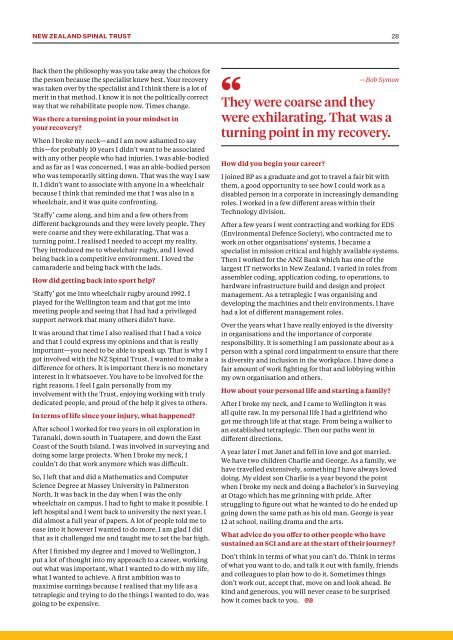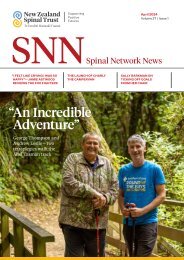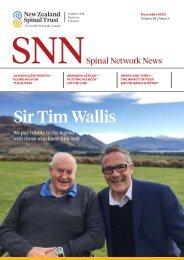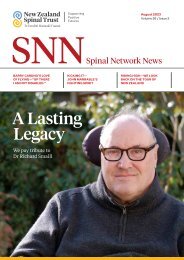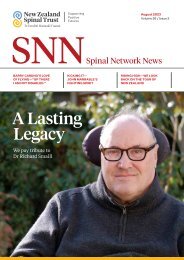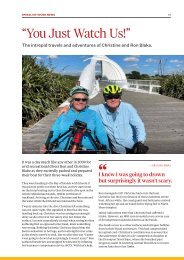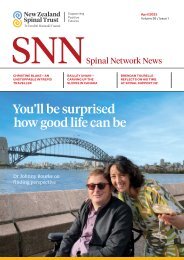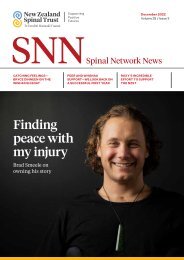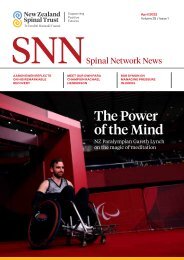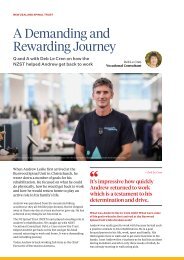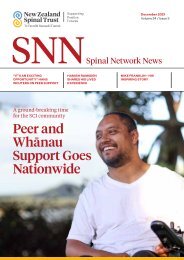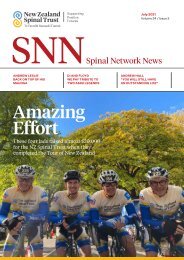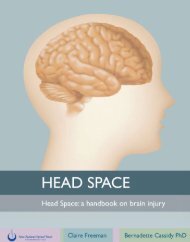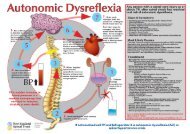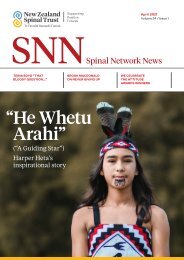SNN_August 2022 Issue_web low res
You also want an ePaper? Increase the reach of your titles
YUMPU automatically turns print PDFs into web optimized ePapers that Google loves.
NEW ZEALAND SPINAL TRUST 28<br />
Back then the philosophy was you take away the choices for<br />
the person because the specialist knew best. Your recovery<br />
was taken over by the specialist and I think there is a lot of<br />
merit in that method. I know it is not the politically correct<br />
way that we rehabilitate people now. Times change.<br />
Was there a turning point in your mindset in<br />
your recovery?<br />
When I broke my neck—and I am now ashamed to say<br />
this—for probably 10 years I didn’t want to be associated<br />
with any other people who had injuries. I was able-bodied<br />
and as far as I was concerned, I was an able-bodied person<br />
who was temporarily sitting down. That was the way I saw<br />
it. I didn’t want to associate with anyone in a wheelchair<br />
because I think that reminded me that I was also in a<br />
wheelchair, and it was quite confronting.<br />
‘Staffy’ came along, and him and a few others from<br />
different backgrounds and they were lovely people. They<br />
were coarse and they were exhilarating. That was a<br />
turning point. I realised I needed to accept my reality.<br />
They introduced me to wheelchair rugby, and I loved<br />
being back in a competitive environment. I loved the<br />
camaraderie and being back with the lads.<br />
How did getting back into sport help?<br />
‘Staffy’ got me into wheelchair rugby around 1992. I<br />
played for the Wellington team and that got me into<br />
meeting people and seeing that I had had a privileged<br />
support network that many others didn’t have.<br />
It was around that time I also realised that I had a voice<br />
and that I could exp<strong>res</strong>s my opinions and that is really<br />
important—you need to be able to speak up. That is why I<br />
got involved with the NZ Spinal Trust. I wanted to make a<br />
difference for others. It is important there is no monetary<br />
inte<strong>res</strong>t in it whatsoever. You have to be involved for the<br />
right reasons. I feel I gain personally from my<br />
involvement with the Trust, enjoying working with truly<br />
dedicated people, and proud of the help it gives to others.<br />
In terms of life since your injury, what happened?<br />
After school I worked for two years in oil exploration in<br />
Taranaki, down south in Tuatapere, and down the East<br />
Coast of the South Island. I was involved in surveying and<br />
doing some large projects. When I broke my neck, I<br />
couldn’t do that work anymore which was difficult.<br />
So, I left that and did a Mathematics and Computer<br />
Science Degree at Massey University in Palmerston<br />
North. It was back in the day when I was the only<br />
wheelchair on campus. I had to fight to make it possible. I<br />
left hospital and I went back to university the next year. I<br />
did almost a full year of papers. A lot of people told me to<br />
ease into it however I wanted to do more. I am glad I did<br />
that as it challenged me and taught me to set the bar high.<br />
After I finished my degree and I moved to Wellington, I<br />
put a lot of thought into my approach to a career, working<br />
out what was important, what I wanted to do with my life,<br />
what I wanted to achieve. A first ambition was to<br />
maximise earnings because I realised that my life as a<br />
tetraplegic and trying to do the things I wanted to do, was<br />
going to be expensive.<br />
—Bob Symon<br />
They were coarse and they<br />
were exhilarating. That was a<br />
turning point in my recovery.<br />
How did you begin your career?<br />
I joined BP as a graduate and got to travel a fair bit with<br />
them, a good opportunity to see how I could work as a<br />
disabled person in a corporate in increasingly demanding<br />
roles. I worked in a few different areas within their<br />
Technology division.<br />
After a few years I went contracting and working for EDS<br />
(Environmental Defence Society), who contracted me to<br />
work on other organisations' systems. I became a<br />
specialist in mission critical and highly available systems.<br />
Then I worked for the ANZ Bank which has one of the<br />
largest IT networks in New Zealand. I varied in roles from<br />
assembler coding, application coding, to operations, to<br />
hardware infrastructure build and design and project<br />
management. As a tetraplegic I was organising and<br />
developing the machines and their environments. I have<br />
had a lot of different management roles.<br />
Over the years what I have really enjoyed is the diversity<br />
in organisations and the importance of corporate<br />
<strong>res</strong>ponsibility. It is something I am passionate about as a<br />
person with a spinal cord impairment to ensure that there<br />
is diversity and inclusion in the workplace. I have done a<br />
fair amount of work fighting for that and lobbying within<br />
my own organisation and others.<br />
How about your personal life and starting a family?<br />
After I broke my neck, and I came to Wellington it was<br />
all quite raw. In my personal life I had a girlfriend who<br />
got me through life at that stage. From being a walker to<br />
an established tetraplegic. Then our paths went in<br />
different directions.<br />
A year later I met Janet and fell in love and got married.<br />
We have two children Charlie and George. As a family, we<br />
have travelled extensively, something I have always loved<br />
doing. My eldest son Charlie is a year beyond the point<br />
when I broke my neck and doing a Bachelor’s in Surveying<br />
at Otago which has me grinning with pride. After<br />
struggling to figure out what he wanted to do he ended up<br />
going down the same path as his old man. George is year<br />
12 at school, nailing drama and the arts.<br />
What advice do you offer to other people who have<br />
sustained an SCI and are at the start of their journey?<br />
Don’t think in terms of what you can’t do. Think in terms<br />
of what you want to do, and talk it out with family, friends<br />
and colleagues to plan how to do it. Sometimes things<br />
don’t work out, accept that, move on and look ahead. Be<br />
kind and generous, you will never cease to be surprised<br />
how it comes back to you.


